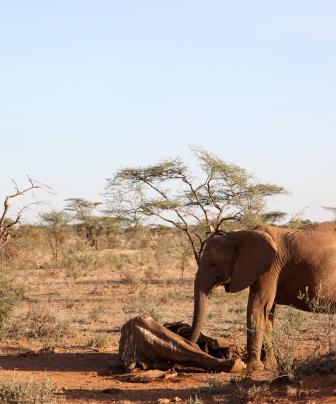Leading Scientists Conclude Elephant Poaching in Africa Has Not Decreased in Past Decade

A new scientific paper warns that the world cannot lower its guard on protecting elephants.
The paper, published yesterday (24 June), presents rigorously peer-reviewed analysis showing that while elephant poaching has declined in East Africa, it has not diminished in the rest of the continent since 2011.
Poaching levels remain high in West, Central and Southern Africa – and are likely unsustainable in West and Central Africa, meaning some elephant populations in these regions are at risk of extinction.
The sobering news comes as there appears to be a creeping, unsubstantiated and arbitrary perception that elephant poaching is in decline across Africa. Indeed, certain governments in southern Africa – Botswana, Namibia, South Africa, Zambia and Zimbabwe – support the resumption of commercial international trade in ivory and last year attempted to sell their ivory stockpiles despite increasing poaching in the region and the risk of such trade further exacerbating it.
Mary Rice, EIA’s Executive Director, said:
“This is a reminder to those who think we have solved the problem of elephant poaching that it is a reckless belief. Let us be clear – elephant poaching is not declining across Africa and in fact remains high and unsustainable.”
EIA investigations and engagement with wildlife traffickers show that elephant poaching and ivory trafficking continue to pose a serious threat to elephants, particularly in West and Central Africa. EIA is also very concerned about increasing poaching in in countries such as Botswana and South Africa, previously considered safe havens for elephants.
In 2019 alone, more than 44 tonnes of ivory were seized, representing at least 6,500 dead elephants, with more ivory seized last year than in the previous three years (2016-18); this includes the world’s largest ivory seizure of 9,120kg of ivory, in Vietnam in March 2019.
Rice added:
“While certain developments such as the ivory ban in China and improvements in enforcement in East Africa are having a positive impact on elephant populations in East Africa, we cannot ignore the onslaught of poaching in all other regions across the continent.
“We cannot afford to take our collective eye off the ball and must continue to enhance our efforts to tackle wildlife crime and the associated corruption and poor rule of law which facilitates such crime.”
*
Note to readers: please click the share buttons above or below. Forward this article to your email lists. Crosspost on your blog site, internet forums. etc.
Featured image is from EIA

